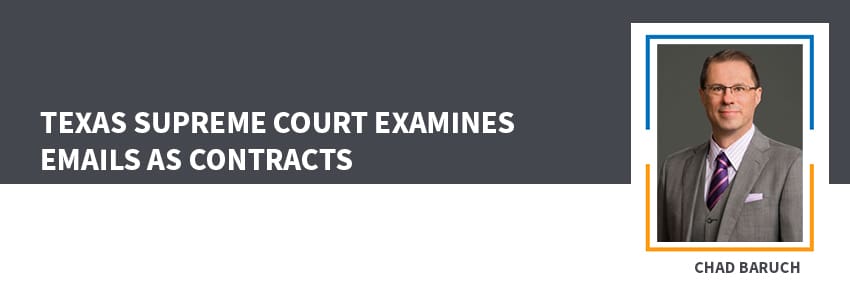
The Supreme Court of Texas recently decided two cases involving efforts to enforce email exchanges as contracts. In Copano Energy, LLC v. Bujnoch (18-0044), the parties exchanged numerous emails before their anticipated signing of a formal contract. But they never executed the formal contract.
One party then sued, claiming that the emails cumulatively constituted an enforceable written contract satisfying the statute of frauds. The Supreme Court acknowledged that the written memorandum necessary to fulfill the statute of frauds need not necessarily be contained in a single instrument; multiple documents may combine to constitute a written contract. The Court further acknowledged the possibility that such multiple documents could be in the form of emails. So, it is at least conceivably possible for a series of email exchanges, taken cumulatively, to constitute a written contract satisfying the statute of frauds.
But the Court ultimately held that the email exchange in Copano failed to contain all essential terms of the contemplated agreement, and therefore was not complete “in every material detail” as required to satisfy the statute of frauds. The Court further noted that the emails themselves made clear that discussion of the material terms to be included are part of “a forward-looking request to negotiate a contract.” As a result, the Court concluded that the emails did not constitute a written contract that satisfied the statute of frauds.
In Chalker Energy Partners III, LLC v. Le Norman Operating LLC (18-0352), an unsuccessful bidder for oil and gas interests brought a breach of contract claim against the sellers. Again, the claim alleged that the contract was in an email between the parties. The Supreme Court again acknowledged the possibility that a contract may be formed in an email or a series of emails.
In Chalker, the parties had entered into a confidentiality agreement to enable contract negotiations. That confidentiality agreement stated that no contract would be deemed to exist unless the parties reached a “definitive agreement.” The Court held that the parties’ email exchanges contained preliminary agreements in contemplation of a future formalized document, and therefore did not meet the requirement for a “definitive agreement” necessary to form a contract.
Together, these cases make clear that an email—or series of emails— can be enforced as a contract under Texas law. But for that to occur, the emails must contain every essential term of the contract; there must be writing or a series of writings from which the Court can ascertain every necessary term of the contract. Additionally, both Copano and Chalker suggest that if the parties’ emails explicitly contemplate the execution of a formal instrument, that will undermine any future claim that emails themselves are a contract.
